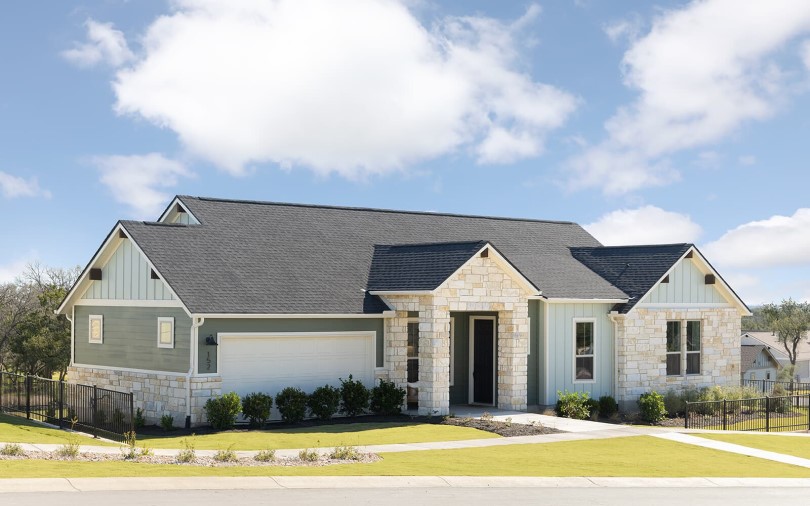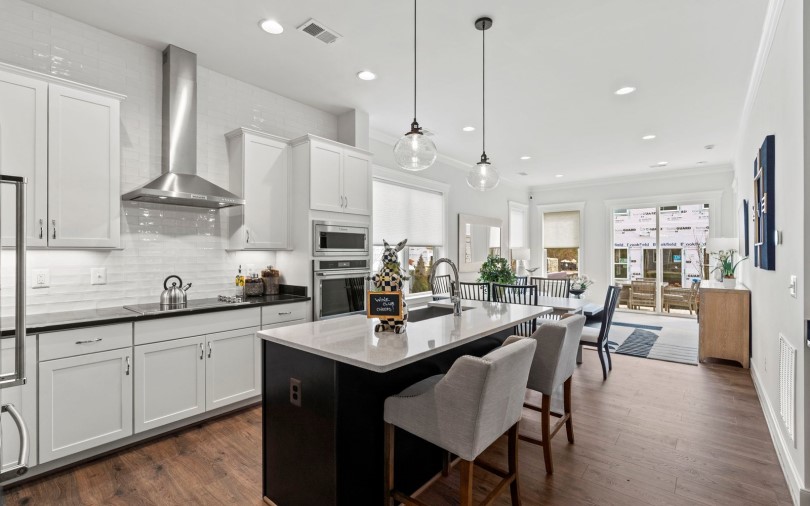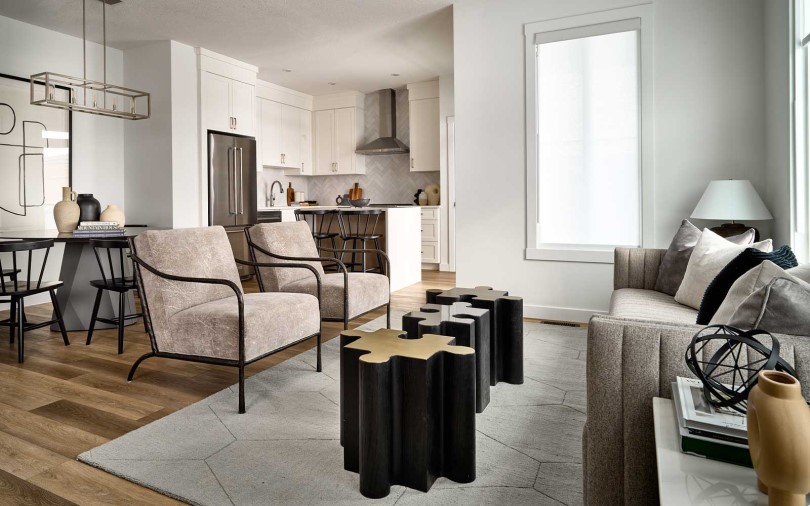Empty Nest, Full Life: Is it Time to Downsize?

Often, downsizing your home can be the first step in this stage, giving you a fresh start for this new phase of life—but is it the right first step for you?
From emotional to financial factors, it can be challenging to know where to start when making this decision. While there isn’t a universally defined “right time” that fits everyone, we can walk you through some things to consider to help you decide if it’s the “right time” for you.

Heritage Shores Community, Bridgeville, Delaware
What questions should I ask myself about downsizing to a smaller home?
Downsizing is an exciting first step in a new stage of life, but knowing if it’s the right decision for you can be difficult. Here are some questions you should ask yourself to help guide your decision-making process:
1. Why do I want to downsize?
If downsizing is still an abstract idea in the back of your mind, clearly identifying the “why” or what motivates you to consider this decision can help clarify if it is the right choice. Are you looking to reduce expenses, simplify your lifestyle, or minimize maintenance?
Exploring the underlying motivations behind your desire to downsize can help you better understand your priorities, values, and goals, which empowers you to make choices that help you reach your dreams for the future.
2. What kind of lifestyle do I want to have?
Being an empty nester is a chance to give yourself back some of the time you’ve dedicated to your family and career over the years. Before you jump to where you want to live, you need to consider how you want to live.
When you think about your free time, how do you envision enjoying it? Do you enjoy working in the garden and enjoying the great things you grow? Do you like tinkering on that old car or motorcycle? You may want to travel, explore the world, or hit the trails to be closer to nature.
Opting for a 55+ community can be an excellent choice for empty nesters. These communities are tailored to the needs and preferences of this stage of life, offering amenities, programming, and activities specifically designed to enhance retirement lifestyles. With fitness classes, social events, and so much more, 55+ communities provide a supportive and enriching environment where residents can enjoy an active, fulfilling life.
Downsizing doesn’t mean downgrading your lifestyle; it means less time spent caring for your home and more time spent doing the things you love. The key is to envision living your best life, whatever that looks like to you, and then work backward to figure out how to get there.

3. Where do I want to live?
The next step is to consider not only the physical location of the home but the type of home as well. Do you want to escape suburbia and enjoy a vibrant, downtown lifestyle where you can walk to the latest trendy restaurant? Or do you want to escape the hustle and bustle and find a quiet place where you can sit outdoors with a good book?
Make sure to ask yourself the tough questions as well – is it important to stay close to your kids, and what does “close” mean to you? Do you want to be in the area where they grew up so they feel at home when they visit, or do you want a completely new location that they’ll be excited to explore?
The type of home you live in will depend on all of those considerations—you’re probably not going to find a spacious ranch house in the city, so make sure your ideal location and home type align.
4. Does it make sense financially to downsize right now?
Most empty nesters have lived in their current home for at least a decade, if not longer, so you can make a good profit if you sell. You can then use that money towards a new house, pay off any existing debts, go on that amazing vacation, or, depending on the housing market, all of the above.
If you go with a new construction home, your profit will stretch further since they're built more efficiently than older homes. This means you’re paying less to heat and cool your home as well as other ongoing maintenance and upkeep, which can add up over time.
Another way to think about the financial benefits is to consider, “What will not moving cost me?” With the kids gone, how much money and energy is used to heat and cool rooms that aren’t utilized? As my home ages, what will it cost me to replace and repair major household systems and appliances?
It can get pricey when you add up the cost of replacing items like the roof, HVAC systems, water heater, and major appliances. If you currently maintain your lawn, you may reach an age where you can no longer do it yourself and will need to hire someone to help with mowing, leaf blowing, or snow removal.
Cost can be extended beyond price tags. Your time and energy have value, so how much of it are you spending on home maintenance, yard upkeep, cleaning, upgrades, replacements, and home improvement projects? In a more efficient new construction home, your monthly maintenance financial costs decrease, and many communities include exterior yard care, giving you more time to do the things you enjoy. Spending the weekend playing with the grandkids sounds much better than pulling weeds.

Spieth Floor Plan, Cottage Collection, Kissing Tree Community, San Marcos, Texas
5. What’s my plan for the future, both short-term and long-term?
For many empty nesters, downsizing can coincide with retirement. You’re still living a full, active lifestyle; now, you just have more time for it. When you’re thinking about your home for the future, it’s important to take the time to consider and plan for both now and years from now.
In the short term, if your kids will be living with you on their breaks from college, it makes sense to keep a space for them that can convert to a general guest space when they’re back at school. In the future, you will have space for the grandkids to have a sleepover or room for your favorite hobby, like painting, sewing, or yoga.
Envisioning the long-term future is when harder questions arise—will there be a time when an older relative needs your care and wants to live with you? Are you planning ahead for your health? Does this home make sense to be the last or next-to-last home you’d like to live in?
Many empty nesters place high importance on a single-level home for accessibility but don’t want the maintenance of a ranch-style house. Condominiums are a great option as they typically have easy access with elevators, amenities, and more for all lifestyles. Not only do they eliminate the physical and financial toll of exterior maintenance, but you have neighbors nearby should you need immediate assistance.

6. What do I do with all my stuff?
A home, especially one you’ve owned for years, is full of sentimental items and objects with special memories. When faced with the idea of downsizing, many empty nesters pass because they can’t imagine saying goodbye to such precious treasures. Instead of viewing downsizing as getting rid of all your sentimental items, think of it as emphasizing the things that are truly important. Don’t try to dive in and tackle it all at once; go room by room and be thoughtful throughout the process so you can feel good about your decisions when you reach the end.
It’s important to be honest with yourself – does the fondue pot still in the box have the same sentimental value as your grandmother’s vintage coffee table? Just because your child's artwork in first grade brings back sentimental memories doesn’t mean you need to keep it. Snap a photo of it, ask if they want it back, and discard it if they don’t. You still have the artwork and memories that go with it – without the clutter.
Also, don’t hold onto things just because you think your children might want them in the future. Have those conversations now and learn if they want the China plates, silverware, crystal glassware, or ornate furniture instead of keeping it “just in case” they do later. Have the kids go through the items you’re considering getting rid of and let them take them now. Not only is it less stuff for you, but you get the bonus of seeing them enjoy it now instead of missing it later.
Lastly, use caution if you opt for a storage unit. While they can be great for the items you still use only occasionally – holiday decorations, camping supplies, pool and summer fun – don’t cram it full of stuff you never utilize just to hold on to it. Keep the space organized so you can get to what you need without having to rearrange and pull everything out
7. Am I emotionally prepared to downsize?
Downsizing is more than just a physical transition; it’s often an emotionally charged process. If you’re moving out of the home where you raised your kids, you may feel overwhelmed with countless memories from when they were little. You may feel a sense of loss, whether it’s over the lifestyle you’ve had or your changing identity as a parent. There may even be a feeling of anxiety or uncertainty as you navigate away from the familiar into a new home and community.
Downsizing can also be an exciting time in your life! You may feel a new sense of freedom that comes with the ability to explore the world on your own time and live life exactly as you want. There may be a feeling of lightness and new energy as you let go of physical and emotional clutter and embrace a simple, more intentional way of living. You may feel relieved and unburdened moving away from a larger home and adopting a low-maintenance lifestyle.
You’ll most likely experience a full range of emotions, including nostalgia, sadness, excitement, and relief. Take the time to process what you’re feeling and acknowledge that it’s okay to feel that way. If you need some extra help, seek support from friends, family, or professionals.

Beaumont Floor Plan, 55+ Villas Collection, The Crest at Linton Hall Community, Bristow, Virginia
What are the benefits of downsizing?
Downsizing your home can offer a range of practical and lifestyle-related benefits. Here are some of the main advantages:
1. Financial savings
Condos and bungalows typically have lower price points than single-family homes. Moving to a smaller, more affordable home can significantly reduce your monthly expenses, including your mortgage payment, property taxes, insurance premiums, and utility bills. A smaller floor plan also requires less décor and furnishings, which means you’ll spend less to style and design your home.
2. Reduced maintenance and upkeep
Moving into a smaller home, condo, or bungalow eliminates or reduces many chores that can keep you from doing the things that actually bring you joy. Fewer rooms and less square footage mean less to dust and vacuum. A smaller yard or HOA-maintained exterior means you don’t have to worry about spending your whole weekend mowing the lawn, pressure-washing the driveway, and weeding the flower beds. Less time spent on chores means more time for your favorite hobbies, outdoor recreation, or travel.

Armstrong Floor Plan, Brightside Collection, Seton Community, Calgary, Alberta
3. Less clutter
When you move from a large home to a smaller one, you’re forced to declutter and embrace simplicity. While it may be overwhelming and hard to part with items that may carry sentimental memories, it can be helpful to think of it as moving into a new phase of life that is more relaxing and fun. Also, an abundance of things sitting around can cause visual stress. Things are in the way; you can’t find what you need – it can be a source of underlying anxiety that you don’t need.
4. Increased flexibility and freedom
Downsizing offers greater flexibility and freedom in choosing where and how you want to live. You can move to a more desirable neighborhood or city or closer to the amenities you desire. Many new home communities offer a perfect middle ground – walkable neighborhoods that are close to nearby cities so you can enjoy the best of both worlds.
Taking advantage of these types of communities comes with a variety of benefits. Instead of driving for your morning brew, walk to your local coffee shop. This increases your level of exercise, keeps you physically active, and improves your health. That morning walk also keeps you socially active. There’s more engagement with your neighbors, which can help you feel safer and more involved in the community.
5. Improved quality of life
Overall, downsizing your home can improve your quality of life. By prioritizing simplicity, financial stability, and personal fulfillment, you create a living situation that supports your values and goals. You can focus on what truly matters to you, which leads to great happiness, contentment, and overall well-being.

Knowing if it’s time to downsize is a personal decision with many factors to consider. Be sure to ask yourself the tough questions and factor in the benefits to help you decide if it’s the right time to simplify your lifestyle.
When you’re ready to move forward with a fresh start in the next chapter of your life, contact us to explore Brookfield Residential communities. One of our experienced sales representatives can help you find a new home you’ll love. We’ll be expecting you!
